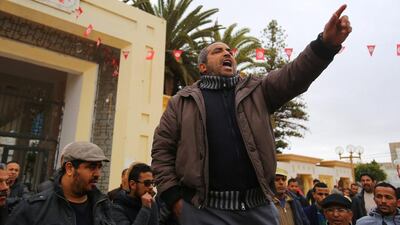TUNIS // Hundreds of protesters demanding jobs clashed with police in several Tunisian towns on Saturday, blocking the route of visiting president Beji Caid Essebsi in one region, on the sixth anniversary of the country’s revolution.
Local residents said protests that erupted in the southern town of Ben Guerdane had spread over the weekend to several other areas such as Sidi Bouzid, Meknassi and Gafsa, where Mr Essebsi visited to mark the 2011 uprising that ousted autocrat Zine El Abidine Ben Ali.
Six years after the revolt, Tunisia is hailed as a model of democratic transition, but rural central and southern regions remain flashpoints for rioting in marginalised towns where many young Tunisians see little economic opportunity or progress.
In Gafsa, angry youths protested against Mr Essebsi’s visit, throwing stones and blocking the road. Local media and residents said the president’s convoy was forced to change its route before he left by air.
In Sidi Bouzid, the cradle of the Tunisian revolution which was sparked by the death of a street vendor protesting against official corruption and abuses, hundreds demonstrated in front of the local governorate, making the same demands as six years ago.
“We raised the same slogans as 2011 ... work is our right ... no fear, and the street belongs to the people,” said local resident Attia Athmouni.
In Meknassi, police arrested some protesters late on Friday. But the protests continued in Meknassi and Manzel Bouziane on Saturday.
The presidency said Mr Essebsi announced development projects which will provide more job opportunities in Gafsa, the heart of the country’s state-run phosphate business, whose exports have also been disrupted by protests over jobs.
After a day of calm following a visit by a delegation of ministers to Ben Guerdane, near the Libyan border, protesters clashed again on Saturday with police, local residents said.
Since the 2011 revolution, Tunisia has mostly avoided the political violence that has plagued other “Arab Spring” countries. The North African country emerged as a symbol of peaceful democratic change with free elections, a new constitution and compromise between Islamist and secular rivals.
But economic progress, a central demand of many Tunisians, has failed to match the country’s political advances. In rural southern and central regions, where farming remains one of the few sources of income, tensions often flare over the lack of jobs and economic opportunities.
* Reuters

